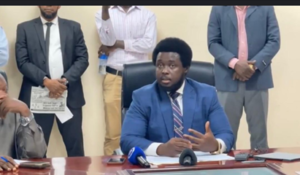By Kadiatu Sankoh
The Anti-Corruption Commission (ACC) convened a press conference to address key findings in the 2022 and 2023 Auditor General’s Reports, reaffirming its commitment to promoting accountability in Sierra Leone. Commissioner Francis Ben Kaifala opened the session with a call for greater diligence among public officials, noting that the existence of the ACC underscores the need for a stronger culture of accountability in governance.


“If everyone was committed to doing their job properly, there would be no need for an Anti-Corruption Commission,” said Kaifala. “The very fact that we have this institution highlights failures in accountability. My hope is that one day we won’t need to chase people to do the work they’re entrusted to do.”
Kaifala highlighted that while some issues raised in the Auditor General’s report stem from administrative lapses, the public often perceives them as financial misconduct, due to their inclusion in the audits. He stressed that many of these issues could have been avoided with proper oversight, and that not all discrepancies involved financial loss.
The Commissioner further suggested that serious crimes involving state funds and revenue mismanagement should carry harsher penalties to deter future misconduct, including capital punishment in extreme cases.
Key Findings in the Auditor General’s Reports
Kaifala outlined several major concerns uncovered in the 2022 and 2023 reports, focusing on specific ministries and departments:
Ministry of Agriculture: The ministry was found to have paid 11 million Leones annually to ghost workers. Additionally, no records existed for payments made by private investors for the use of combine harvesters.
Ministry of Mines: An unaccounted-for 34 million Leones was squandered on duty waivers.
Kono District Council: Discrepancies were discovered, including the absence of proper records for pay-as-you-earn transactions.
Addressing criticisms that the ACC primarily targets lower-level offenders, Kaifala explained that high-ranking officials are often not directly involved in the paperwork or processes leading to discrepancies. Instead, subordinate employees frequently handle what he described as the “dirty work.” He emphasized that the systemic nature of the problems extends across multiple ministries.
To combat these persistent issues, the Commissioner strongly advocated for the digitization of government processes. He argued that transitioning from analog systems to digital ones would reduce human interaction with cash, thereby minimizing opportunities for corruption.
“The government should move towards digitizing processes, as this would reduce human contact with cash and minimize corruption,” Kaifala explained. “This would be a key step in preventing future issues.”
In response to inquiries about the ACC’s own transparency, Kaifala clarified that the commission is regularly audited by external auditors. He confidently asserted that under his leadership, the ACC has maintained a clean record and has consistently upheld standards of accountability.
“Our slate is clean, and the ACC has always maintained a clean record, even before I took office,” he assured.
As Sierra Leone grapples with entrenched issues of corruption, the ACC’s findings underscore the urgent need for structural reforms in both public and private sectors. The commission’s emphasis on digitization and its call for stricter penalties signal a proactive approach to addressing the systemic challenges highlighted in the Auditor General’s reports.